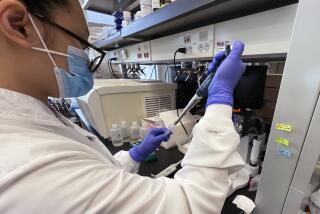MEDICINE ALLERGIES : Study Disputes Test Linking Illnesses to Environment
- Share via
A UC San Francisco study published today casts doubt on the increasingly popular belief that many illnesses can be traced to foods, chemicals and environmental pollutants.
The study, in the New England Journal of Medicine, disputes the scientific validity of one of the main diagnostic tools used by physicians who call themselves clinical ecologists or environmental doctors. That test--injecting a tiny portion of food or other suspected substance into the skin of a patient, then waiting to see if the patient reports feeling ill--simply does not work, the researchers report.
The report does not dismiss the possibility that pollutants, food additives and even foods themselves may cause symptoms such as depression, fatigue, irritability, headaches, stuffy sinuses, nausea and diarrhea. But it does suggest that many of these cases may be psychosomatic in nature, according to an accompanying editorial in the New England Journal.
The results of the UC San Francisco study came as somewhat of a surprise to some environmental doctors, who, after years of criticism, thought they had begun to gain mainstream acceptance.
“We haven’t heard this kind of criticism in four or five years,” said Dr. Aubrey Worrell, president of the American Academy of Environmental Medicine. “I’m totally surprised that it would appear in the New England Journal now.”
The technique in question, “symptom provocation,” was first described by a Missouri physician in 1961. It is designed to pinpoint a cause-effect relationship between foods and chemicals and symptoms such as an itching nose, watering eyes, plugged ears, scratchy throat, tiredness, chills, nervousness, intestinal gas and aching legs.
The method differs significantly from the traditional allergist’s scratch test, in which a drop of a suspected allergy-causing substance is placed on broken skin, and the physician objectively determines whether a patient has an allergy based on whether or not a rash appears.
Dr. Don L. Jewett, an orthopedic surgeon at UC San Francisco, set out nearly a decade ago to determine if symptom provocation worked as well as practitioners believed.
Because he had undergone what he believed were successful diagnoses and treatments by clinical ecologists for such supposed allergenic symptoms as fatigue and irritable stomach, Jewett said Wednesday in a telephone interview that he was convinced he would “become famous” for proving a scientific basis for this controversial area of medicine. But his results suggest the opposite is true.
Using seven clinical ecologists and 18 of their patients who had previously been diagnosed as having food sensitivities, Jewett set up a double-blind study: Neither doctor nor patient knew if the patients received a dummy shot of salt water or real extracts of chocolate, potato, wheat or other foods to which they may have been sensitive.
The researchers found no difference in reactions to the placebos and the real extracts, leading them to believe that many patients, if not all, imagine their reactions.
That does not mean that their overall symptoms aren’t real, Jewett said, “but it does mean that we have no reliable means of testing for environmental sensitivities.”
Since the study found patients were as likely to respond favorably to placebo treatments as they were to be unaffected by real treatments, Jewett and his colleagues also concluded that there was no reliable way to treat what are believed to be environmental allergies.
“Much of what (environmental doctors) are doing is relatively benign,” Jewett said. “I don’t know anyone who has died of a symptom provocation test. . . . But, in some cases, what’s being recommended to patients is very serious and expensive. If a doctor believes they are allergic to their houses, they are told to sell them. If he believes they are allergic to their workplaces, they are told to quit their jobs. There are some high costs to these decisions. . . .
“In every speciality there are symptoms which we cannot explain, muscle pains, back pains and sinus pains. Life would be a lot simpler if we knew what these symptoms were due to. These doctors thought they had some answers. And maybe they do, but we can’t prove that yet.”
Although there have been some studies upholding their diagnostic and treatment techniques and other recent studies disputing their critics, many clinical ecologists say they are in such demand that they simply do not have time to prove their methods.
“I’ve been so lousy busy, my next routine appointment opening won’t be until sometime in December,” said Dr. Francis J. Waickman, a pediatrician-turned-clinical ecologist from Akron, Ohio. He declined to participate in the UC San Francisco study, he said, because he disagreed with its methodology. Patients were not always given sufficient doses of suspected foods to cause allergic reactions, he said. And participants already had been treated for food sensitivities and therefore might not react in the same way as untreated patients.
Moreover, he said, he already knows from his own clinical experience that his approach works on 95% of patients who have otherwise undiagnosed symptoms.
Some of these undiagnosed symptoms may be caused by sensitivities to the environment, but some may have a psychological origin, and doctors must be trained to know the difference, warned Dr. Anne Ferguson of the University of Edinburgh in an editorial accompanying the study.






